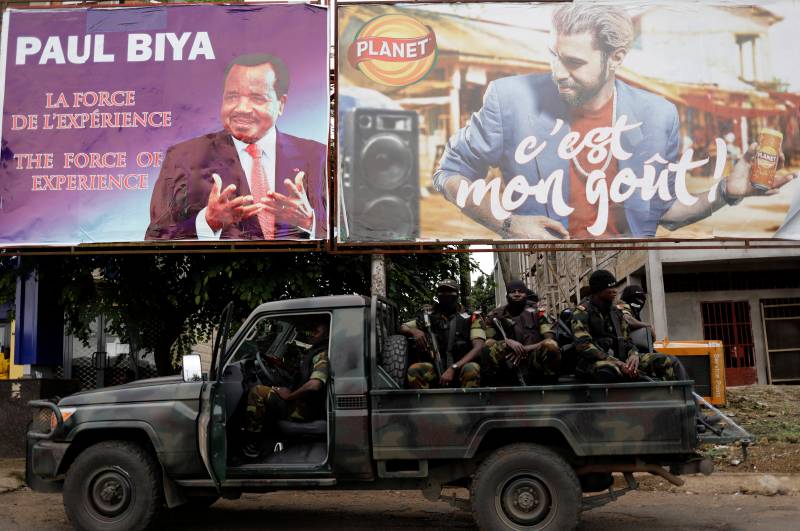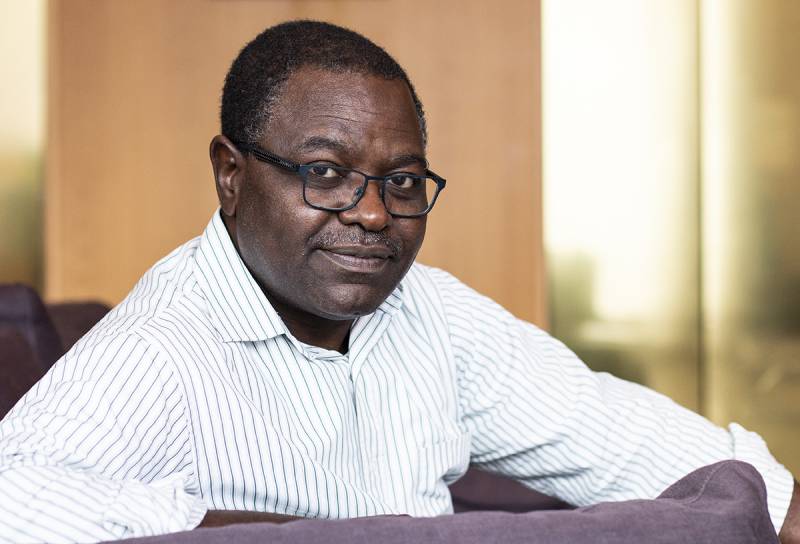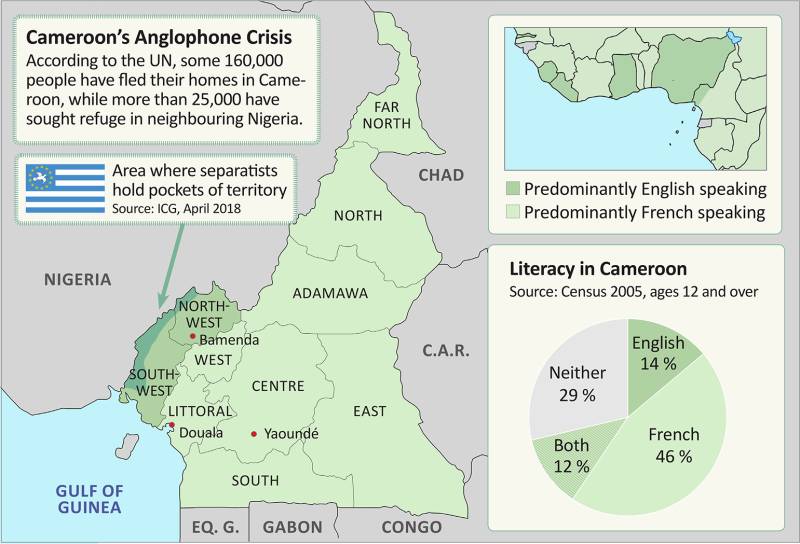Researcher: Signs of anglophone crisis were there 20 years ago

Cameroonian elite Rapid Intervention Battalion (BIR) members during a patrol in the south west city of Buea, Photo: Zohra Bensemra
As Cameroon prepared for a presidential election on 7 October, violence continued in the English-speaking Southwest and Northwest regions. In a prophetic article in 1999, Professor Francis Nyamnjoh described how the state system of divide and rule makes Cameroon’s regional and ethnic groups turn against each other. “Regrettably, this is what we are seeing today”, he tells The Nordic Africa Institute.
The brewing conflict erupted into violence after security forces in October 2017 cracked down on protests calling for English to be used in classrooms and courtrooms in Cameroon’s anglophone regions. Human rights watchdog Amnesty International estimates that 400 citizens have been killed in the past year and 160 members of the security forces since late 2016.
According to Nyamnjoh, the anglophone movement is not only a protest against the marginalisation of the English-speaking population in the former French colony, but also a protest against President Paul Biya, who has held a firm grip on Cameroonian politics for 36 years.
“The fact that anglophones oppose the government doesn’t make it an anglophone problem necessarily. In fact, it is a very Cameroonian problem: of a state that doesn’t deliver, a state that has no business being there because there are no results.”

After decades under the same political system, people have become numb, according to Francis Nyamnjoh. Photo taken at Hotel Gillet in Uppsala in September 2018. Photo: Mattias Sköld
In his 1999 article Cameroon: a country united by ethnic ambition and difference External link, opens in new window. Nyamnjoh, a Cameroonian national himself, described how Biya had turned Cameroon into a country with a chronic lack of vision or commitment to democracy, and had created a corrupt system that had “more room for loyal mediocrity than critical excellence”. He also described how the president had perfected a policy of regional and ethnic balance, instituted by his predecessor Ahmadou Ahidjo, borrowing from the colonial legacy of “decentralised despotism”.
External link, opens in new window. Nyamnjoh, a Cameroonian national himself, described how Biya had turned Cameroon into a country with a chronic lack of vision or commitment to democracy, and had created a corrupt system that had “more room for loyal mediocrity than critical excellence”. He also described how the president had perfected a policy of regional and ethnic balance, instituted by his predecessor Ahmadou Ahidjo, borrowing from the colonial legacy of “decentralised despotism”.
“In reality, this policy is far less about balance than it is about diverting attention from real to imagined problems and causes”, Nyamnjoh wrote.
“The crisis in the anglophone regions continues because of poor governance. The state is using the divide and rule tactic, claiming that ‘the protesters want to divide our beloved country’. In this way it is preventing the formation of a broader movement of Cameroonians, regardless of colonial heritage and postcolonial intermediary identities, rallying against the real problems of the government.”
Francis Nyamnjoh says that the existing climate of conflict and division feeds on caricatures and stereotypes about francophones and anglophones, with short and easy-to-remember, often derogatory, representations of the other.
“You can argue that ethnicity has crystalised around this common idea of Anglo-Saxon heritage, whether real or imagined, in the Cameroonian context – that people identify with an opposition to what they consider as the negative aspects of the French heritage in Cameroon.”

Graphic: Henrik Alfredsson
According to Nyamnjoh, the same principle of divide and rule would also help explain why Cameroon has not seen broader movements for political change, as in Tunisia, Egypt, Burkina Faso or The Gambia.
“After decades under this system, people have become so numb, including the intellectuals that you would expect to speak up.”
Nyamnjoh, a professor of Anthropology at the University of Cape Town is also writer of fiction. In his novels he writes about the fictional country Mimboland. Mimbo in Pidgin English means alcohol, and Mimboland is the land of alcohol and drunks in abundance. The country’s leader, President Longstay, is there forever. He doesn’t produce results, but he is eternally there.
“How come Africa is so full of President Longstays?” says Nyamnjoh.
He hopes that Cameroonians, especially the young, will rise above hollow pretences and aspire for a common humanity, a common ‘Cameroonian-ness’ without shackles.
“Everybody is a human being first, who is entitled to certain needs and a certain respect, before being francophone or anglophone. If we divide we will keep dividing and cut, cut, cut… There is always something to cut and the problem will not disappear.”
Nyamnjoh says that Cameroonians must stop hiding away from the problems of the current government.
“They should not claim that because the questions are posed by anglophones then it is not a Cameroonian problem. The Cameroonian problem is that the leadership has failed us, francophones and anglophones alike.”
TEXT: Mattias Sköld
The presidential election on 7 October
Paul Biya, Cameroon's 85-year-old president, is expected to win a seventh term in office, extending his rule well into his 90s. Biya has been head of state since 1982, when he took over following the resignation of Ahmadou Ahidjo, who had held power since independence in 1960.
Several opposition parties are boycotting the election, with one party leader calling it “a setup for one person to win”. Opposition members have demanded an independent electoral commission, functioning biometric system for voter registration and two-round presidential election.
The crisis in the anglophone regions (the Northwest and Southwest)
The crisis is rooted in historical identity-based grievances. Many anglophones feel they have been politically and economically marginalised.
After security forces in October 2017 responded violently to protests, the movement rapidly developed into an armed insurgency. According to independent observers, such as the International Crisis Group, the government bears a large share of the responsibility for the conflict. It failed to recognise the legitimacy of anglophone grievances, its security forces committed widespread abuses and imprisoned many peaceful activists.
Two armed militias, the Ambazonia Defence Forces and the Southern Cameroons Defence Forces, and several small ‘self-defence’ groups carry out attacks against the security forces. The insurgents have symbolically proclaimed the independence of a new state called ‘Ambazonia’. According to the UN, some 160,000 people have fled their homes in Cameroon, while more than 25,000 have sought refuge in neighbouring Nigeria.
Francis Nyamnjoh
Professor of Anthropology at University of Cape Town, originally from Cameroon. He has written extensively on issues as diverse as democratisation, ethnicity and regionalism in Africa, globalisation, and the role and place of the media in Africa. He was keynote speaker at the Nordica Africa Days 2018, held in Uppsala in September.
